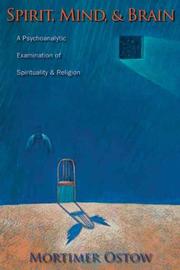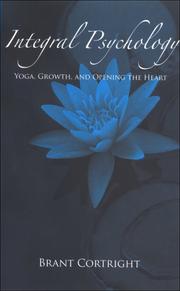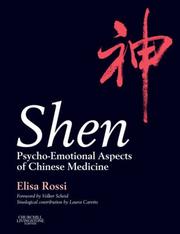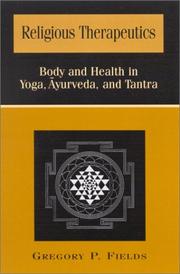| Listing 1 - 8 of 8 |
Sort by
|
Book
ISBN: 1282104799 9786612104794 9027290032 9789027290038 9781282104792 9027252114 9789027252111 Year: 2009 Publisher: Amsterdam Philadelphia John Benjamins Pub. Co.
Abstract | Keywords | Export | Availability | Bookmark
 Loading...
Loading...Choose an application
- Reference Manager
- EndNote
- RefWorks (Direct export to RefWorks)
Panpsychism is the view that all things, living and nonliving, possess some mind like quality. It stands in sharp contrast to the traditional notion of mind as the property of humans and (perhaps) a few select 'higher animals'. Though surprising at first glance, panpsychism has a long and noble history in both Western and Eastern thought. Overlooked by analytical, materialist philosophy for most of the 20th century, it is now experiencing a renaissance of sorts in several areas of inquiry. A number of recent books - including Skrbina's Panpsychism in the West (2005) and Strawson et al's Consciousness and its Place in Nature (2006) - have established panpsychism as respectable and viable. Mind That Abides builds on these works. It takes panpsychism to be a plausible theory of mind and then moves forward to work out the philosophical, psychological and ethical implications. With 17 contributors from a variety of fields, this book promises to mark a wholesale change in our philosophical outlook. (Series A).
Panpsychism. --- Philosophy. --- Mental philosophy --- Humanities --- Animism --- Consciousness --- Philosophy --- Hylozoism --- Consciousness. --- Mind-Body Relations (Metaphysics). --- Psychophysiology.
Book
ISBN: 0190293802 1281998435 9786611998431 0199724091 0197742408 6611998438 9780199724093 9780195301021 0195301021 9780190293802 9781281998439 Year: 2009 Publisher: Oxford New York Oxford University Press
Abstract | Keywords | Export | Availability | Bookmark
 Loading...
Loading...Choose an application
- Reference Manager
- EndNote
- RefWorks (Direct export to RefWorks)
This work connects Western therapeutic techniques with Eastern philosophy and practices while also providing a comprehensive and pragmatic agenda for social work and mental health professionals.
Social service. --- Mind and body. --- Mind-Body Relations (Metaphysics) --- Social Work.

ISBN: 0231139004 9780231139007 0231511205 9780231511209 Year: 2006 Publisher: New York, NY
Abstract | Keywords | Export | Availability | Bookmark
 Loading...
Loading...Choose an application
- Reference Manager
- EndNote
- RefWorks (Direct export to RefWorks)
Preeminent psychoanalyst Mortimer Ostow believes that early childhood emotional attachments form the cognitive underpinnings of spiritual experience and religious motivation. His hypothesis, which is verifiable, relies on psychological and neurobiological evidence but is respectful of the human need for spiritual value. Ostow begins by classifying the three parts of the spiritual experience: awe, Spirituality proper, and mysticism. After he pinpoints the psychological origins of these feelings in infancy, he discusses the foundations of religious sentiment and practice and the brain processes associated with spiritual experience. He then focuses on spirituality's relationship to mood regulation, and the role of negative spirituality in fostering religious fundamentalism and demonic possession.Ostow concludes with an analysis of an essay by the psychoanalyst Donald M. Marcus, who recounts his own spiritual experience during a Native American-style "vision quest" in the woods. Marcus's account demonstrates the constructive potential of spirituality and the way in which spirituality retrieves and recapitulates feelings of attachment to the mother.Persuasively and brilliantly argued, Spirit, Mind, and Brain brings the disciplines of religion, behavorial neuroscience, and philosophy to bear on a groundbreaking new method for understanding religious ritual and belief.
Psychoanalysis and religion. --- Psychology and religion. --- Psychology, Religious. --- Psychoanalytic Interpretation. --- Spirituality. --- Mind-Body Relations (Metaphysics) --- Psychoanalytic Theory. --- Religion and Medicine. --- Psychoanalysis and religion --- Psychology and religion --- Psychology, Religious --- 159.9:2 --- Psychology of religion --- Religion --- Religions --- Religious psychology --- Religion and psychology --- Religion and psychoanalysis --- Godsdienstpsychologie --- Psychological aspects --- Psychology --- 159.9:2 Godsdienstpsychologie --- Mind-Body Relations (Metaphysics). --- spirituality --- religiosity --- mysticism --- psychoanalysis --- psychological health
Book
ISBN: 026228345X 9780262283458 1417561785 9781417561780 Year: 2004 Publisher: Cambridge, Mass. : MIT Press,
Abstract | Keywords | Export | Availability | Bookmark
 Loading...
Loading...Choose an application
- Reference Manager
- EndNote
- RefWorks (Direct export to RefWorks)
"How are the mind and body harnessed together? In The Mind Incarnate Lawrence Shapiro addresses this question by testing two widely accepted hypothesis, the multiple realizability thesis and the separability thesis. He argues that there is significant - though far from decisive - evidence against them." "Collecting evidence from a variety of sources (e.g., neuroscience, evolutionary theory, and embodied cognition) he concludes that the multiple realizability thesis, accepted by most philosophers as a virtual truism, is much less obvious than commonly assumed, and that there is even stronger reason to give up the separability thesis. In contrast to views of mind that tempt us to see the mind as simply being resident in a brain or body, Shapiro's view is a far more encompassing integration of mind, brain, and body than philosophers have supposed."--Jacket.
Mind and body. --- Body Image. --- Mind-Body Relations, Metaphysical. --- Mind and body --- Body Image --- Mind-Body Relations, Metaphysical --- Mental Processes --- Perception --- Psychological Phenomena and Processes --- Psychiatry and Psychology --- Psychology --- Social Sciences --- Psychologic Processes --- Psychologic Processes and Principles --- Psychological Processes --- Phenomena, Psychological --- Processes, Psychologic --- Processes, Psychological --- Psychological Phenomenas --- Psychological Processe --- Sensory Processing --- Processing, Sensory --- Sensation --- Human Information Processing --- Information Processing, Human --- Body-Mind Relations --- Soul-Body Relations --- Mind-Body Relations (Metaphysics) --- Mind-Body Relations (Non-Physiology) --- Body Mind Relations --- Body-Mind Relation --- Metaphysical Mind-Body Relation --- Metaphysical Mind-Body Relations --- Mind Body Relations (Metaphysics) --- Mind Body Relations (Non Physiology) --- Mind Body Relations, Metaphysical --- Mind-Body Relation (Metaphysics) --- Mind-Body Relation (Non-Physiology) --- Mind-Body Relation, Metaphysical --- Relation, Body-Mind --- Relation, Metaphysical Mind-Body --- Relation, Mind-Body (Metaphysics) --- Relation, Mind-Body (Non-Physiology) --- Relation, Soul-Body --- Relations, Body-Mind --- Relations, Metaphysical Mind-Body --- Relations, Mind-Body (Metaphysics) --- Relations, Mind-Body (Non-Physiology) --- Relations, Soul-Body --- Soul Body Relations --- Soul-Body Relation --- Body Representation --- Body Schema --- Body Identity --- Body Images --- Body Representations --- Body Schemas --- Identity, Body --- Image, Body --- Representation, Body --- Schema, Body --- Physical Appearance, Body --- Self Concept --- Body and mind --- Body and soul (Philosophy) --- Human body --- Mind --- Mind-body connection --- Mind-body relations --- Mind-cure --- Somatopsychics --- Brain --- Dualism --- Philosophical anthropology --- Holistic medicine --- Mental healing --- Parousia (Philosophy) --- Phrenology --- Psychophysiology --- Self --- Psychological aspects --- Psychological Phenomena --- Psychiatry --- Mental Processes. --- Perception. --- Psychological Phenomena. --- Psychiatry.

ISBN: 0791480135 1429498196 9781429498197 9780791480137 9780791470718 9780791480137 0791470717 0791470725 9780791470725 9780791470717 Year: 2007 Publisher: Albany State University of New York Press
Abstract | Keywords | Export | Availability | Bookmark
 Loading...
Loading...Choose an application
- Reference Manager
- EndNote
- RefWorks (Direct export to RefWorks)
Integral Psychology connects Eastern and Western approaches to psychology and healing. Psychology in the East has focused on our inner being and spiritual foundation of the psyche. Psychology in the West has focused on our outer being and the wounding of the body-heart-mind and self. Each requires the other to complete it, and in bringing them together an integral view of psychology comes into view.The classical Indian yogas are used as a way to see psychotherapy: psychotherapy as behavior change or karma yoga; psychotherapy as mindfulness practice or jnana yoga; psychotherapy as opening the heart or bhakti yoga. Finally, an integral approach is suggested that synthesizes traditional Western and Eastern practices for healing, growth, and transformation.
Yoga --- Spirituality. --- Mind-Body Relations (Metaphysics) --- Holistic Health. --- Psychotherapy. --- Holistic medicine. --- Psychotherapy --- Holistic health --- Wholistic medicine --- Alternative medicine --- Holism --- Functional medicine --- Health --- Integrative medicine --- Mind and body --- Psychotherapies --- Neurolinguistic Programming --- Sensory Art Therapies --- Medicine, Wholistic --- Wholistic Health Care --- Wholistic Medicine --- Wholistic Therapies --- Holistic Medicine --- Holistic Therapies --- Medicine, Holistic --- Wholistic Health --- Care, Wholistic Health --- Health Care, Wholistic --- Health, Holistic --- Health, Wholistic --- Holistic Therapy --- Therapies, Holistic --- Therapies, Wholistic --- Therapy, Holistic --- Therapy, Wholistic --- Wholistic Therapy --- Integrative Medicine --- Body-Mind Relations --- Soul-Body Relations --- Mind-Body Relations (Non-Physiology) --- Body Mind Relations --- Body-Mind Relation --- Metaphysical Mind-Body Relation --- Metaphysical Mind-Body Relations --- Mind Body Relations (Metaphysics) --- Mind Body Relations (Non Physiology) --- Mind Body Relations, Metaphysical --- Mind-Body Relation (Metaphysics) --- Mind-Body Relation (Non-Physiology) --- Mind-Body Relation, Metaphysical --- Relation, Body-Mind --- Relation, Metaphysical Mind-Body --- Relation, Mind-Body (Metaphysics) --- Relation, Mind-Body (Non-Physiology) --- Relation, Soul-Body --- Relations, Body-Mind --- Relations, Metaphysical Mind-Body --- Relations, Mind-Body (Metaphysics) --- Relations, Mind-Body (Non-Physiology) --- Relations, Soul-Body --- Soul Body Relations --- Soul-Body Relation --- Spiritualities --- Spiritual Therapies --- psychology. --- Philosophy.
Book
ISBN: 1283864460 0813552370 9780813552378 9780813548852 0813548853 9780813548869 0813548861 Year: 2011 Publisher: New Brunswick, NJ
Abstract | Keywords | Export | Availability | Bookmark
 Loading...
Loading...Choose an application
- Reference Manager
- EndNote
- RefWorks (Direct export to RefWorks)
Sleep Paralysis explores a distinctive form of nocturnal fright: the "night-mare," or incubus. In its original meaning a night-mare was the nocturnal visit of an evil being that threatened to press the life out of its victim. Today, it is known as sleep paralysis-a state of consciousness between sleep and wakefulness, when you are unable to move or speak and may experience vivid and often frightening hallucinations. Culture, history, and biology intersect to produce this terrifying sleep phenomenon. Although a relatively common experience across cultures, it is rarely recognized or understood in the contemporary United States. Shelley R. Adler's fifteen years of field and archival research focus on the ways in which night-mare attacks have been experienced and interpreted throughout history and across cultures and how, in a unique example of the effect of nocebo (placebo's evil twin), the combination of meaning and biology may result in sudden nocturnal death.
Sleep Disorders. --- Mind-Body Relations, Metaphysical. --- Dreams. --- Mind and body. --- Sleep disorders. --- Nightmares. --- Body and mind --- Body and soul (Philosophy) --- Human body --- Mind --- Mind-body connection --- Mind-body relations --- Mind-cure --- Somatopsychics --- Brain --- Dualism --- Philosophical anthropology --- Holistic medicine --- Mental healing --- Parousia (Philosophy) --- Phrenology --- Psychophysiology --- Self --- Disorders of sleep --- Nervous system --- Psychology, Pathological --- Bad dreams --- Dreams --- Nightmares --- Dream --- Nightmare --- Body-Mind Relations --- Soul-Body Relations --- Mind-Body Relations (Metaphysics) --- Mind-Body Relations (Non-Physiology) --- Body Mind Relations --- Body-Mind Relation --- Metaphysical Mind-Body Relation --- Metaphysical Mind-Body Relations --- Mind Body Relations (Metaphysics) --- Mind Body Relations (Non Physiology) --- Mind Body Relations, Metaphysical --- Mind-Body Relation (Metaphysics) --- Mind-Body Relation (Non-Physiology) --- Mind-Body Relation, Metaphysical --- Relation, Body-Mind --- Relation, Metaphysical Mind-Body --- Relation, Mind-Body (Metaphysics) --- Relation, Mind-Body (Non-Physiology) --- Relation, Soul-Body --- Relations, Body-Mind --- Relations, Metaphysical Mind-Body --- Relations, Mind-Body (Metaphysics) --- Relations, Mind-Body (Non-Physiology) --- Relations, Soul-Body --- Soul Body Relations --- Soul-Body Relation --- Long Sleeper Syndrome --- Short Sleep Phenotype --- Short Sleeper Syndrome --- Sleep-Related Neurogenic Tachypnea --- Subwakefullness Syndrome --- Sleep Disorders --- Disorder, Sleep --- Disorder, Sleep Wake --- Disorders, Sleep --- Disorders, Sleep Wake --- Long Sleeper Syndromes --- Neurogenic Tachypnea, Sleep-Related --- Neurogenic Tachypneas, Sleep-Related --- Phenotype, Short Sleep --- Phenotypes, Short Sleep --- Short Sleep Phenotypes --- Short Sleeper Syndromes --- Sleep Disorder --- Sleep Phenotypes, Short --- Sleep Related Neurogenic Tachypnea --- Sleep Wake Disorder --- Sleep-Related Neurogenic Tachypneas --- Sleeper Syndrome, Long --- Sleeper Syndrome, Short --- Sleeper Syndromes, Long --- Sleeper Syndromes, Short --- Subwakefullness Syndromes --- Syndrome, Long Sleeper --- Syndrome, Short Sleeper --- Syndrome, Subwakefullness --- Syndromes, Long Sleeper --- Syndromes, Short Sleeper --- Syndromes, Subwakefullness --- Tachypnea, Sleep-Related Neurogenic --- Tachypneas, Sleep-Related Neurogenic --- Wake Disorder, Sleep --- Wake Disorders, Sleep --- Sleep Hygiene --- Psychological aspects --- Diseases --- Sleep Wake Disorders.

ISBN: 9780702036859 0702036854 9780443101816 0443101817 Year: 2007 Publisher: [Edinburgh] Churchill Livingstone/Elsevier
Abstract | Keywords | Export | Availability | Bookmark
 Loading...
Loading...Choose an application
- Reference Manager
- EndNote
- RefWorks (Direct export to RefWorks)
Affective and dynamic functions --- Complementary Therapies --- Medicine, East Asian Traditional --- Mental Processes --- Behavior and Behavior Mechanisms --- Psychological Phenomena and Processes --- Therapeutics --- Psychiatry and Psychology --- Medicine, Traditional --- Analytical, Diagnostic and Therapeutic Techniques and Equipment --- Culture --- Anthropology, Cultural --- Anthropology --- Social Sciences --- Anthropology, Education, Sociology and Social Phenomena --- Medicine, Chinese Traditional --- Acupuncture Therapy --- Emotions --- Mind-Body Relations, Metaphysical --- Body-Mind Relations --- Soul-Body Relations --- Mind-Body Relations (Metaphysics) --- Mind-Body Relations (Non-Physiology) --- Body Mind Relations --- Body-Mind Relation --- Metaphysical Mind-Body Relation --- Metaphysical Mind-Body Relations --- Mind Body Relations (Metaphysics) --- Mind Body Relations (Non Physiology) --- Mind Body Relations, Metaphysical --- Mind-Body Relation (Metaphysics) --- Mind-Body Relation (Non-Physiology) --- Mind-Body Relation, Metaphysical --- Relation, Body-Mind --- Relation, Metaphysical Mind-Body --- Relation, Mind-Body (Metaphysics) --- Relation, Mind-Body (Non-Physiology) --- Relation, Soul-Body --- Relations, Body-Mind --- Relations, Metaphysical Mind-Body --- Relations, Mind-Body (Metaphysics) --- Relations, Mind-Body (Non-Physiology) --- Relations, Soul-Body --- Soul Body Relations --- Soul-Body Relation --- Regret --- Feelings --- Emotion --- Feeling --- Regrets --- Acupotomy --- Acupuncture Treatment --- Pharmacoacupuncture Therapy --- Pharmacoacupuncture Treatment --- Therapy, Acupuncture --- Acupotomies --- Acupuncture Treatments --- Therapy, Pharmacoacupuncture --- Treatment, Acupuncture --- Treatment, Pharmacoacupuncture --- Acupuncture --- Chinese Traditional Medicine --- Traditional Chinese Medicine --- Traditional Tongue Assessment --- Traditional Tongue Diagnosis --- Chinese Medicine, Traditional --- Chung I Hsueh --- Traditional Medicine, Chinese --- Zhong Yi Xue --- Hsueh, Chung I --- Tongue Assessment, Traditional --- Tongue Diagnoses, Traditional --- Tongue Diagnosis, Traditional --- Traditional Tongue Assessments --- Traditional Tongue Diagnoses --- Medicine, Kampo --- Science, Social --- Sciences, Social --- Social Science --- Cultural Anthropology --- Material Culture --- Ethnography --- Culture, Material --- Ethnographies --- Material Cultures --- Qualitative Research --- Beliefs --- Cultural Background --- Cultural Relativism --- Customs --- Background, Cultural --- Backgrounds, Cultural --- Belief --- Cultural Backgrounds --- Cultural Relativisms --- Cultures --- Relativism, Cultural --- Relativisms, Cultural --- Indigenous Medicine --- Primitive Medicine --- Traditional Medicine --- Ethnomedicine --- Folk Medicine --- Folk Remedies --- Home Remedies --- Medicine, Folk --- Medicine, Indigenous --- Medicine, Primitive --- Folk Remedy --- Home Remedy --- Remedies, Folk --- Remedies, Home --- Remedy, Folk --- Remedy, Home --- Traditional Pulse Diagnosis --- Traditional Medicine Practitioners --- Materia Medica --- Nostrums --- Pharmacognosy --- Plants, Medicinal --- Ethnopharmacology --- Therapy --- Treatment --- Therapeutic --- Therapies --- Treatments --- Disease --- Behavior And Behavior Mechanism --- Human Information Processing --- Information Processing, Human --- East Asian Medicine --- East Asian Traditional Medicine --- Medicine, East Asia --- Medicine, Far East --- Medicine, Oriental --- Medicine, Oriental Traditional --- Medicine, Traditional, East Asia --- Oriental Medicine --- Oriental Medicine, Traditional --- Oriental Traditional Medicine --- Traditional East Asian Medicine --- Traditional Far Eastern Medicine --- Traditional Medicine, Oriental --- Traditional Medicine, East Asia --- Asia Medicines, East --- East Asia Medicine --- East Asia Medicines --- East Asian Medicines --- East Medicine, Far --- East Medicines, Far --- Far East Medicine --- Far East Medicines --- Medicine, East Asian --- Medicine, Traditional Oriental --- Medicines, East Asia --- Medicines, Far East --- Traditional Oriental Medicine --- Traditional Oriental Medicines --- Alternative Therapies --- Therapy, Alternative --- Therapy, Complementary --- Alternative Medicine --- Complementary Medicine --- Medicine, Alternative --- Medicine, Complementary --- Therapies, Alternative --- Therapies, Complementary --- therapy

ISBN: 0791490866 0791449157 9780791449158 0791449165 9780791449165 9780791490860 Year: 2001 Publisher: New York : State University of New York Press,
Abstract | Keywords | Export | Availability | Bookmark
 Loading...
Loading...Choose an application
- Reference Manager
- EndNote
- RefWorks (Direct export to RefWorks)
Religious Therapeutics explores the relationship between psychophysical health and spiritual health and presents a model for interpreting connections between religion and medicine in world traditions. This model emerges from the work's investigation of health and religiousness in classical Yoga, Āyurveda, and Tantra--three Hindu traditions noteworthy for the central role they accord the body. Author Gregory P. Fields compares Anglo-European and Indian philosophies of body and health and uses fifteen determinants of health excavated from texts of ancient Hindu medicine to show that health concerns the person, not the body or body/mind alone. This book elucidates multifaceted views of health, and--in the context of spirituality and healing--explores themes such as mental health, meditation, and music.
Medicine, Ayurvedic --- Medicine --- Yoga --- Tantrism --- Human body --- Mind-Body Therapies --- Mental Processes --- Exercise Movement Techniques --- Religion --- Medicine, Traditional --- Spiritual Therapies --- Religious Philosophies --- Psychological Phenomena and Processes --- Complementary Therapies --- Humanities --- Culture --- Physical Therapy Modalities --- Anthropology, Cultural --- Therapeutics --- Psychiatry and Psychology --- Analytical, Diagnostic and Therapeutic Techniques and Equipment --- Anthropology --- Social Sciences --- Anthropology, Education, Sociology and Social Phenomena --- Mind-Body Relations, Metaphysical --- Religion and Medicine --- Mental Healing --- Hinduism --- Health & Biological Sciences --- History of Medicine --- Hindu Ethics --- Ethics, Hindu --- Healing, Mental --- Hindu Medicine --- Ayurvedic Medicine --- Medicine, Hindu --- Siddha Medicine --- Medicine, Siddha --- Breathing Exercises --- Meditation --- Muscle Stretching Exercises --- Medicine and Religion --- Parish Nursing --- Body-Mind Relations --- Soul-Body Relations --- Mind-Body Relations (Metaphysics) --- Mind-Body Relations (Non-Physiology) --- Body Mind Relations --- Body-Mind Relation --- Metaphysical Mind-Body Relation --- Metaphysical Mind-Body Relations --- Mind Body Relations (Metaphysics) --- Mind Body Relations (Non Physiology) --- Mind Body Relations, Metaphysical --- Mind-Body Relation (Metaphysics) --- Mind-Body Relation (Non-Physiology) --- Mind-Body Relation, Metaphysical --- Relation, Body-Mind --- Relation, Metaphysical Mind-Body --- Relation, Mind-Body (Metaphysics) --- Relation, Mind-Body (Non-Physiology) --- Relation, Soul-Body --- Relations, Body-Mind --- Relations, Metaphysical Mind-Body --- Relations, Mind-Body (Metaphysics) --- Relations, Mind-Body (Non-Physiology) --- Relations, Soul-Body --- Soul Body Relations --- Soul-Body Relation --- Science, Social --- Sciences, Social --- Social Science --- Therapy --- Treatment --- Therapeutic --- Therapies --- Treatments --- Disease --- Cultural Anthropology --- Material Culture --- Ethnography --- Culture, Material --- Ethnographies --- Material Cultures --- Qualitative Research --- Group Physiotherapy --- Neurological Physiotherapy --- Neurophysiotherapy --- Physical Therapy Techniques --- Physical Therapy --- Physiotherapy (Techniques) --- Group Physiotherapies --- Modalities, Physical Therapy --- Modality, Physical Therapy --- Physical Therapies --- Physical Therapy Modality --- Physical Therapy Technique --- Physiotherapies (Techniques) --- Physiotherapies, Group --- Physiotherapy, Group --- Physiotherapy, Neurological --- Techniques, Physical Therapy --- Therapy, Physical --- Postoperative Care --- Physical Therapist Assistants --- Beliefs --- Cultural Background --- Cultural Relativism --- Customs --- Background, Cultural --- Backgrounds, Cultural --- Belief --- Cultural Backgrounds --- Cultural Relativisms --- Cultures --- Relativism, Cultural --- Relativisms, Cultural --- Alternative Therapies --- Therapy, Alternative --- Therapy, Complementary --- Alternative Medicine --- Complementary Medicine --- Medicine, Alternative --- Medicine, Complementary --- Therapies, Alternative --- Therapies, Complementary --- Psychologic Processes --- Psychologic Processes and Principles --- Psychological Processes --- Phenomena, Psychological --- Processes, Psychologic --- Processes, Psychological --- Psychological Phenomenas --- Psychological Processe --- Intelligent Design --- Taoism --- Design, Intelligent --- Designs, Intelligent --- Intelligent Designs --- Philosophies, Religious --- Philosophy, Religious --- Religious Philosophy --- Taoisms --- Exorcism --- Therapies, Spiritual --- Spiritual Healing --- Exorcisms --- Healing, Spiritual --- Healings, Spiritual --- Spiritual Healings --- Occultism --- Parapsychology --- Spirituality --- Indigenous Medicine --- Primitive Medicine --- Traditional Medicine --- Ethnomedicine --- Folk Medicine --- Folk Remedies --- Home Remedies --- Medicine, Folk --- Medicine, Indigenous --- Medicine, Primitive --- Folk Remedy --- Home Remedy --- Remedies, Folk --- Remedies, Home --- Remedy, Folk --- Remedy, Home --- Traditional Pulse Diagnosis --- Materia Medica --- Nostrums --- Pharmacognosy --- Plants, Medicinal --- Ethnopharmacology --- Prayer --- Religious Beliefs --- Religious Ethics --- Beliefs, Religious --- Ethic, Religious --- Prayers --- Religions --- Religious Belief --- Secularism --- Exercise Movement Technics --- Pilates Training --- Pilates-Based Exercises --- Exercises, Pilates-Based --- Movement Techniques, Exercise --- Pilates Based Exercises --- Training, Pilates --- Exercise Therapy --- Sports --- Exercise --- Human Information Processing --- Information Processing, Human --- Mind-Body Medicine --- Mind Body Medicine --- Mind Body Therapies --- Mind-Body Therapy --- Therapies, Mind-Body --- Therapy, Mind-Body --- Body, Human --- Human beings --- Body image --- Human anatomy --- Human physiology --- Mind and body --- Tantricism --- Tantrism, Hindu --- Magic --- Mysticism --- Yoga exercises --- Philosophy, Indic --- Health Workforce --- Religious aspects --- therapy --- Medicine, Ayurvedic. --- Yoga. --- Hinduism. --- Ayurveda --- Ayurvedic medicine --- Ayurvedism --- Hindu medicine --- Medicine, Oriental
| Listing 1 - 8 of 8 |
Sort by
|

 Search
Search Feedback
Feedback About UniCat
About UniCat  Help
Help News
News